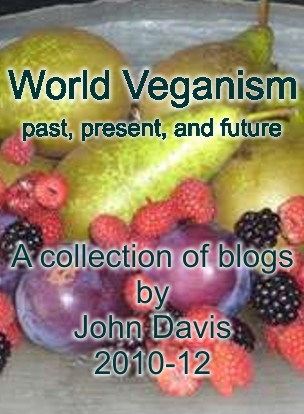April 13, 2011
The perpetual problem in promoting the plant-food diet: the meat-eater says he/she would like to switch to plant-food only but, for whatever reason, says it's too difficult to make the change all at once. Do you:
- - scream about animal abuse and demand they go vegan immediately.
- - continually demean their less-than-perfect diet as they slowly progress, or even stop.
- - try to help them find a route that works best for them, and offer support on the journey.
If 3 then your response is likely to depend whether your primary concern is health, animal rights, religion or the environment - or some combination of those, making for endless permutations of pathways into the light...
Some of the many possible first steps towards a completely plant-food diet:
2. Avoid the products of all animal farmingthis evolved from British vegetarianism and leaves a lot of indirect products such as eggs, dairy products (and wool). We know that they all ultimately involve a lot of slaughter of male calves, chicks (and sheep), but many, probably most, vegans today did get there via that route.
Sadly, once they're safely across, some think that same route should then be blocked to others.
3. Avoid factory farmingto me this looks more American but I've seen it elsewhere too. It eliminates eggs/dairy from the outset but allows wild-caught fish (but not farmed fish) in the first step. In theory it could include wild birds and mammals too, but city dwellers won't find much of that in their supermarkets.
This second route seems to follow from the Henry David Thoreau legacy of living in the wild - plant-food with a bit of fishing. Though Thoreau did say he felt guilty about the fishing.
For most city-dwellers this 'life in the wild' is just fantasy, but it is easy enough to argue from both health and ethical perspectives that 'no animal farming' could be a better first step than 'no slaughter'. The obvious downside to this being that if all 6 billion humans switched to eating fish, there soon wouldn't be any more fish in the sea.
4. The 'meat-free Monday' approach.a smaller first step. In the UK, and probably elsewhere, there has been a significant movement towards organic and free-range meat - again for both health and ethical reasons against industrialized mass production. I know several organic/free-range meat and dairy farmers in the countryside where I live. But is this - or the others above - a step towards plant-food only? Or is it just an end in itself?
Eating this way is more expensive, so likely in itself to at least reduce excessive consumption.
Persuade people to cut out meat one day a week and hope they gradually expand it to the others. This is often promoted for environmental reasons, as a way of reducing emissions from the livestock industry, though not all types of livestock are equally responsible, and again some people will just switch to fish etc. The Catholic Church has been promoting meat-free Fridays for the last 2,000 years, but it would probably be hard to find anyone who ended up vegan as a result. It still leaves eggs/dairy/fish etc. which most people don't see as 'meat'.
5. P robably lots more
- I recently saw a suggestion of go plant-only for breakfast, then sometime later change lunch, and eventually dinner. Some will still only ever get as far as step one of that route too.
Any of these steps are of course the permanent diet for some people, there is no guarantee they will ever take the next step. However, without route #1 there would undoubtedly be far fewer vegans in the world than we have today.
As someone once said 'a journey of a thousand miles begins with a single step' and many will never go the full distance. If millions of people simply reduced their meat consumption in any of the ways above, it would save a lot of animals, improve their health and help the planet.
People who have taken even a small first step will usually have started a thought process which eventually points towards other possible steps - and if millions at least start thinking then there is the possibility of a cultural shift in attitudes.
Of course vegans will always promote the destination, but they do need to give some thought to how others can make the journey. It is unfortunate that many perpetuate the misuse of the word 'vegetarian' - when what they are really arguing against is ovo-lacto-vegetarianism as a permanent diet rather than just a first step.
The latest stats from the USA show that 66% of all types of vegetarians there no longer use eggs/dairy at all - but a lot of American vegans still seem to spend more time attacking the remaining 33% than attacking the meat industry. Maybe they're just an easier target with a convenient label - how you do label someone who only eats plant-food plus wild-caught fish?
Vegans could make a major contribution by helping to promote Pure Vegetarianism - a term being increasingly used in India and elsewhere to specify a diet of foods derived wholly from plants. That would allow veganism to be more clearly seen as an ethical lifestyle, not just a diet.
For the real origins of 'vegetarian' see:
www.vegsource.com/john-davis/vegetarian-equals-vegan.html
 John Davis
John Davis
